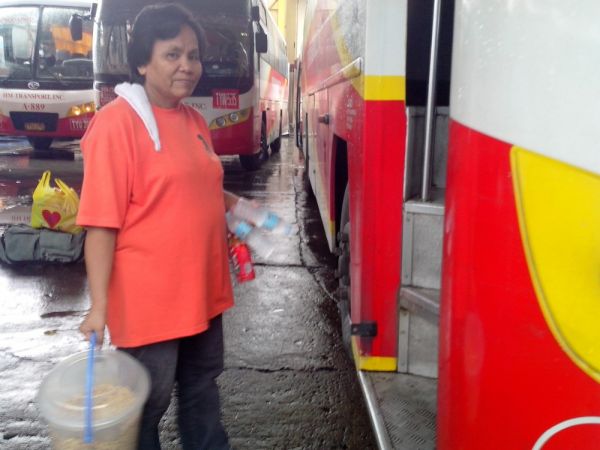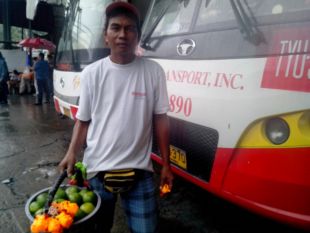Vendors Double as “Eyes on the Street” in a City’s Dodgy Bus Terminals

Vendors like Melanie Valderama are protective of their workspace.
Dominador Blance is an ex-soldier. He’s been trained to engage in combat, guard his fort, protect his people. At 54, however, Blance is looking out for the safety not of people on some conflict-ridden hillside, but of the passengers in one of the busy bus terminals in Cubao, a robust commercial hub in Quezon City.
Blance isn’t a security guard. He has no uniform, no gun, nothing that would help him stop a thief in his tracks or detain a mugger. Blance wears an old cap on his head and is dressed in plain clothes – a white shirt and comfy shorts. Instead of carrying a weapon, he totes a basket full of fruit adorned with dangling Pikachu keychains. He is one of at least eight vendors in HM bus terminal, the transit hub that caters to passengers going to the province of Sta. Cruz, Laguna. He hops onto the buses at 7 a.m. and hawks his fruit and keychains until 5 o’clock. The fruit he gets from from Nepa-Q market at P25 (less than one cent) per kilo; he sells them for P10 apiece. As for the Pikachus, he buys them for P7 in Divisoria, a market that is famous in Manila for its cheap wares.
But the apparent simplicity of Blance’s purpose belies a dual role. Aside from earning money from vending, Blance also guards the bus terminal and serves as a lookout for pickpockets. “I’ve been working here since I was 34 years old,” he says. “We’ve memorized who goes here, who the regular passengers are. We can spot when someone looks suspicious.” One time, he saw a man dressed in formal clothes acting strangely. “He kept on leaving the bus,” says Blance. “He will go back, leave again, go back.” Blance alerted a security guard. True enough, when authorities boarded a bus, they found that the man had just stolen a bag from a female passenger.
When I asked him how he knew the man was up to no good, Blance says proudly: “I still have the blood of a soldier in me.”
He only served in the military for two years. He was stationed in Camp Capinpin in Tanay, Rizal province before he went on absence without leave, citing the difficulty of his tasks. He later became a security guard and then a private investigator, but quit after five years. “I left my job after I learned that I could earn from selling stuff on a bus.” His brother also sells items at the bus terminal, which is where he got the idea. When ask what made him stick with being a bus vendor, Blance says it’s having additional savings from not having to pay for transportation.

Dominador Blance has been “guarding” one of the bus terminals in Cubao for 15 years.
Blance also works as a dispatcher for 15 days a month for another bus line, and thus gets free rides on those buses as well. He assembles passengers from 10 in the evening to six in the morning and earns P90 ($2 USD) for each bus he dispatches, averaging six buses per night. He doesn’t work under any contract, but flashes his ID to me with pride.
“I’m old. It’s hard to get a job. This is enough for me,” he says. And just barely enough to support his seven children, one of whom he’s still putting through college.
Melanie Valderama, 51, knows what he means. She has eight children, three of whom are still studying, and relies on her older children for financial help. She’s been selling fried peanuts and mineral water for 15 years on the buses, and can’t think of any other form of employment that would be available to a widow who hasn’t finished high school.
Like Blance, Valderama is protective of the bus terminal. “I’m not afraid of encountering snatchers in buses. We know what to do.” She says there was an instance when a man, looking very much like an ordinary passenger, entered a bus. He was even holding a bag. When he stole from one of the passengers, it was Blance and other vendors who alerted the security guard in the terminal. The thief was caught.
But most days, says Valderama, life in the bus terminal is peaceful. Passengers rush in and out and bus vendors like her, both young and old, try to get them to buy something on the fly. At 24, Richard Aldel is one of these younger vendors. Unlike Valderama and Blance, who sell food, he has a stack of pirated DVDs in his hand. “It’s better to sell them in buses as I don’t have to pay for a stall,” he says. Though he looks as if he just graduated high school, Aldel has four kids (and never did finish high school). He goes to the bus terminal at 1 p.m., stays until seven and then goes home. He rides the buses as far as Ortigas, 15 minutes away, and has been doing this for four years.
I ask him if he’s also encountered snatchers or pickpockets on any of the buses. He shakes his head.
“I know of former snatchers who’ve became bus vendors, though,” he says, smiling mischievously.
Photos by Purple Romero









